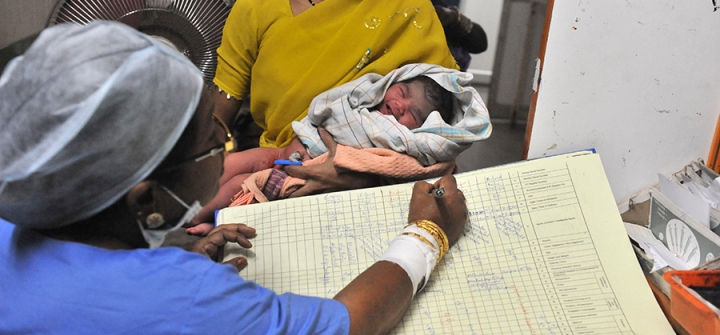A Vital Boost for Policy
Birth certificates are a ticket to ride … they unlock a host of social services, as Philip Setel, a Vital Strategies vice president and director of the Civil Registration and Vital Statistics improvement program explained at a Data for Health convening last week.
Yet all too often—up to 40% of the time, in fact—a birth certificate is never provided. And it isn’t just about having the piece of paper; governments need data to make a host of decisions about health.
To that end, Vital Strategies’ Data Impact Program collaborates with governments to expand the use of data to enhance public health planning and policymaking.
“When we went to countries and we talked about the Data for Health initiative, we knew there would be a lot of interest in the data collection part—the civil registration, vital statistics, getting more birth and death data, and the NCD risk factor surveillance arm,” said Adam Karpati, MD, Senior Vice President of Public Health Programs at Vital Strategies, in a follow-up interview after last week’s gathering.
They weren’t so sure, though, that the data impact part—which is a lot more about internal capacity and how data feeds into government decision-making—would prove as appealing. But that concern was soon put to rest, Karpati said. “In fact, we didn’t have to sell that part very hard. The governments we’re working with immediately responded and immediately identified this particularly area as one they wanted to improve.”
That led the Data Impact team to help analysts who typically work with epidemiological reporting of surveillance data, rates and trends to build data analysis skills more relevant for policymaking—including economic impact. Ultimately, the effort led to policy briefs that influenced change on key public health initiatives, such as preventing road injuries, improving water safety, providing better care for patients with tuberculosis.
For example, in Bogota, Colombia, a Data-to-Policy workshop gave participants an opportunity to apply economic impact analysis methods to support public health decision-making on topics prioritized by the National Health Institute and the Ministry of Health. The workshop fueled policy briefs on topics such as reducing lead toxicity and obesity in children, and injury due to head injuries among motorcyclists, putting data-driven policy analyses in the hands of health officials to guide regulations, funding decisions and program planning.
Another initiative led to better dental care in the Philippines, where 88% of children under 5 have more than 5 cavities—leading to eating problems, malnutrition, and affecting school attendance. Data for Health worked with the Quezon City Department of Health to use data to develop a new program to improve dental health habits, in day care, schools and at home.
Collecting the data isn't the end of the story, though. “Collecting the data and ensuring that the data is of the highest quality doesn’t in and of itself mean that data’s going to be used,” Karpati explained.
Translating the data into action and policy requires effective communication with the population. Enter the journalists.
Recognizing that need, Vital Strategies’ Data Impact program also offered support around how Ministry communication staff—and external journalists—shared data with the public. It sponsored workshops—one in Latin America, one in Africa—with Ministry communication staff and external journalists, sharing best practices on data analysis, receiving and integrating data into reporting, and translating and results to non-technical audiences.
“What we found, in our engagements with governments, is that desire, that interest in better leveraging data to make decisions, was universal,” Karpati added.
Furthermore, Karpati said, “These challenges of translating data into action are universal—they’re not limited to low-resource settings.” He pointed to Brazil, which possesses a lot of internal capacity, during the Zika outbreak as an example.
Last week's Data for Health meeting offered a host of other lessons learned, from countries like China, where a Shanghai initiative is helping to inform efforts in other cities, and Malawi. Emma Mabvumwe, from Malawi’s Department of Planning and Policy Development, emphasized the importance of strategy, given competing health priorities and limited staff. It’s key, she said, to make data available during the goal planning stages, so they can feed into and inform priorities. Also, activities must be timed carefully to avoid overburdening staff already stretched thin.
Alain Labrique, PhD of the Johns Hopkins Bloomberg School of Public Health also shared a round of “tweetable” lessons learned from the initiative to date:
- Context matters: the enabling environment and ecosystem maturity varies dramatically from country to country, affecting how rapidly and efficiently a program can be implemented.
- A research to program rapid adaptive cycle is plausible, where formative work and rigorous evaluation can inform program implementation.
- New platform and technology development takes initially longer to build than initially imagined, but once it’s done, you don’t have to reinvent the wheel and subsequent programs move faster.
- Institutional resistance to methodological changes can be high, and needs to be considered in the timeline for deployment and adoption.
- We often underestimate the hidden value in data obscurity—where improving data can be seen as a threat to status quo; e.g., improved supervision, program performance, state of population health.
Please see also our May 8 reporting from New York on the Data for Health meeting, The Lifesaving Power of Data.
Ed. Note: Michael R. Bloomberg is a benefactor of the Johns Hopkins Bloomberg School of Public Health, which publishes Global Health NOW.
Join the tens of thousands of subscribers in more than 100 countries who rely on Global Health NOW summaries and exclusive articles for the latest public health news. Sign up for our free weekday enewsletter, and please share the link with friends and colleagues:http://www.globalhealthnow.org/subscribe.html
A nurse registers the records of a new born baby boy at Governement Gandhi Hospital in Hyderabad on October 31, 2011. Noah Seelam/AFP/Getty Images





